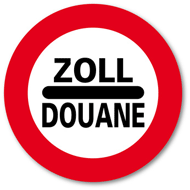 CUSTOMS CLEARANCE IN THE EUROPEAN UNION CUSTOMS CLEARANCE IN THE EUROPEAN UNION
The European Union is also a Customs Union. This means that after clearing customs in one EU country, you can distribute your goods to other EU locations without further customs involvement. This is known as “free circulation within the EU.” In theory, it should make no difference whether goods are imported via France, The Netherlands, Belgium, The UK, or any other EU country.
VARIATION IN CUSTOMS LEGISLATION AND PRACTICE BETWEEN EU COUNTRIES
Regardless of the above, the actual implementation of customs legislation varies between countries. Because of this, we would recommend you to centralize your import and customs clearance in one country, which is suitable to your needs, if at all possible.
All EU Member countries apply the same product classifications and duty rates. However, the interpretation of these rates can differ and the attitude of local customs and other government authorities are important factors to take into consideration.
VALUE ADDED TAX DUE ON IMPORT
In most EU countries, Value Added Tax (VAT) becomes due when goods are presented for clearance at customs. You can reclaim this payment as an input tax credit, but it may take several months to receive the refund. Various EU Member countries have implemented regimes which allow you to avoid the up-front VAT payment. Removing these payments is one of the ways that some countries encourage international companies to base their European operations in their territory. (See section on choosing your business location within Europe).
Once goods have cleared customs, no further VAT is due when goods are shipped to another EU Member country or a non-EU destination (the VAT zero rate applies), unless additional work is carried out on the goods (i.e. additional value is added).
In other words, onward sale or distribution of goods from the country of customs clearance does not usually result in additional VAT.
AUTHORISED ECONOMIC OPERATOR (AEO)
If you are likely to be a significant importer or exporter of goods to or from the European Union, you may find it advantageous to obtain Authorised Economic Operator (AEO) status. As such, you will be able to benefit from simplified security and customs procedures.
To obtain this status, you will need a physical presence in the EU. Your choice of country to locate your business may be important for AEO status. The advantages to be obtained vary between countries dependent on how they have implemented the AEO rules, so this may be important factor when choosing where to base your physical operation.
There are three types of AEO Certificates, with different sets of advantages, as follows:
- Customs Simplifications (AEOC);
- Security and Safety (AEOS);
- Combined Customs Simplifications/ Security and Safety (AEOF).
To learn more, please call Tony Baker at 416-500-7287
or CLICK HERE if you prefer to contact us by email.
HOW WE CAN HELP
MAWW can determine the route to compliance that is most appropriate to your needs and help you through the CE Marking Process easily and cost effectively.
We can let you know whether self-assessment is possible for your product, whether lab testing will be required, whether a Notified Body must be involved, and what the certification process will cost.
For written answers regarding your particular product, please click here.
For a FREE TELEPHONE CONSULTATION on this complex topic, please call Tony Baker
at 416.500.7287 or toll-free at 1-855-222-6299 (MAWW)
For an outline of the following topics, please click below:
;
|

